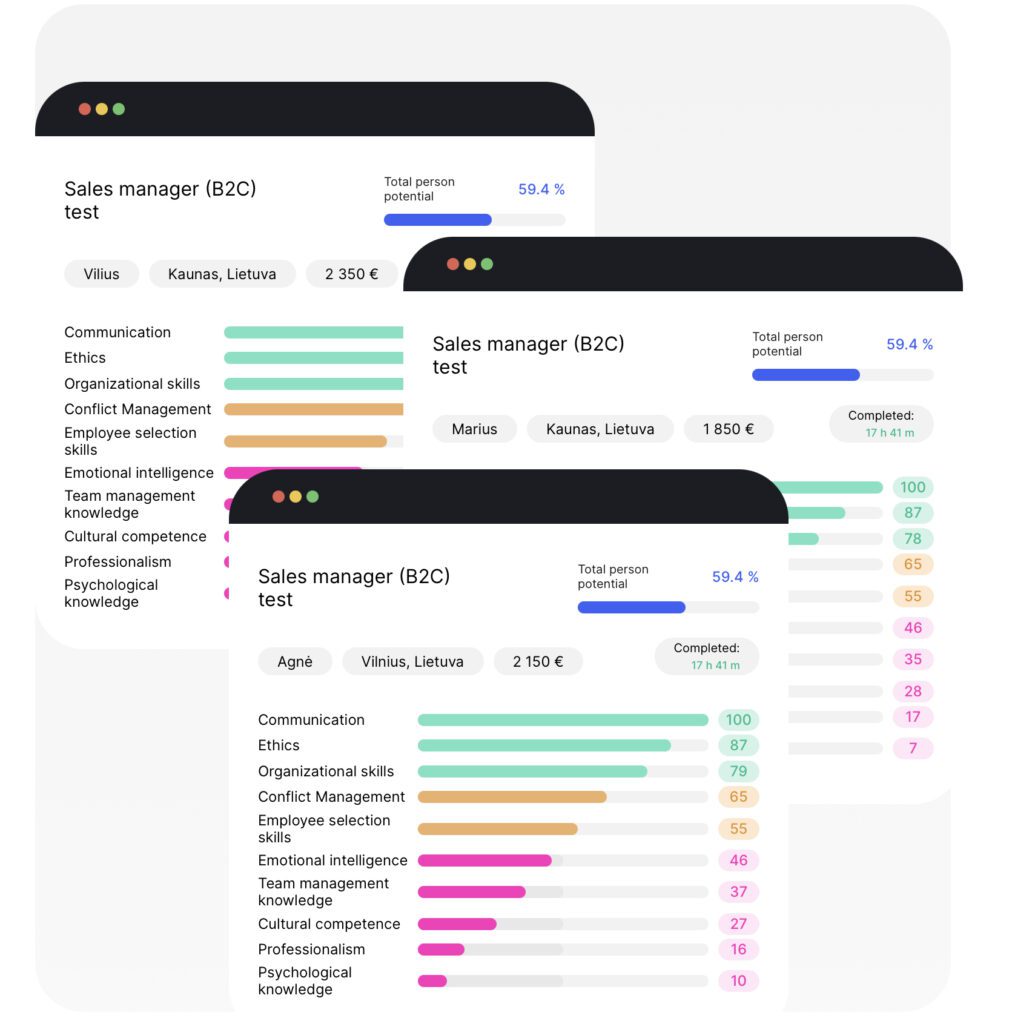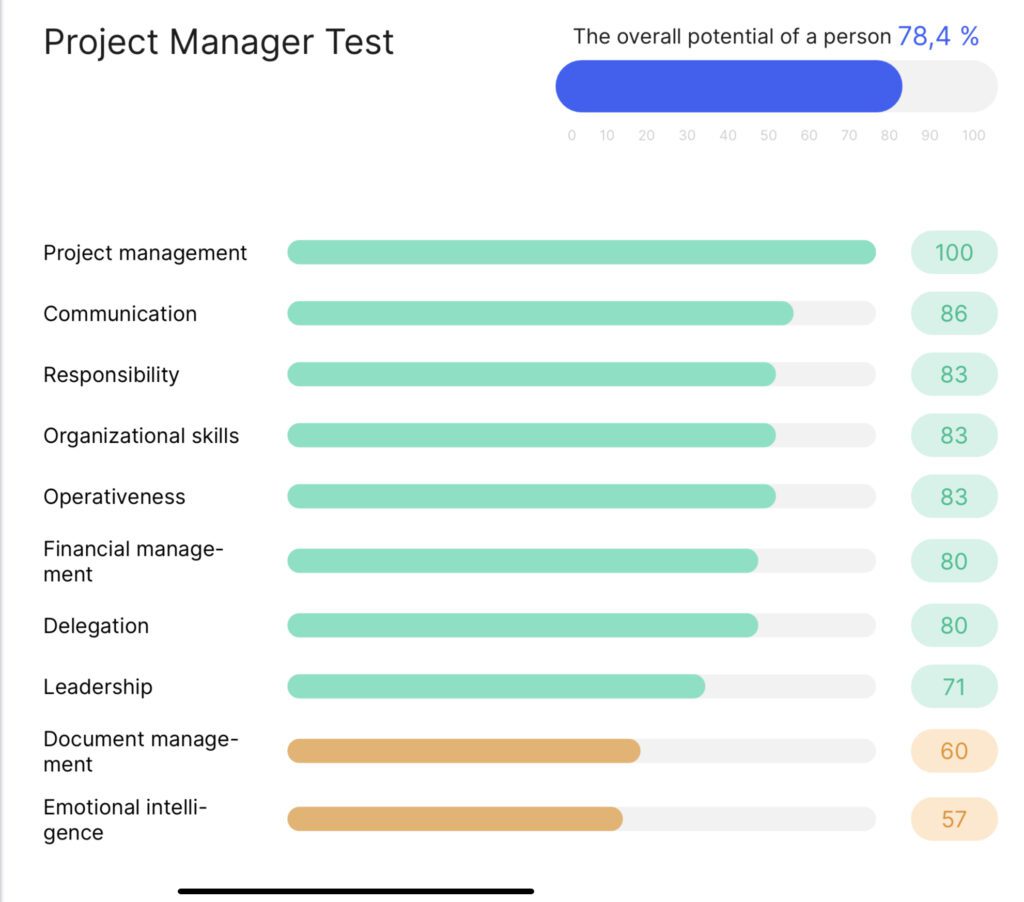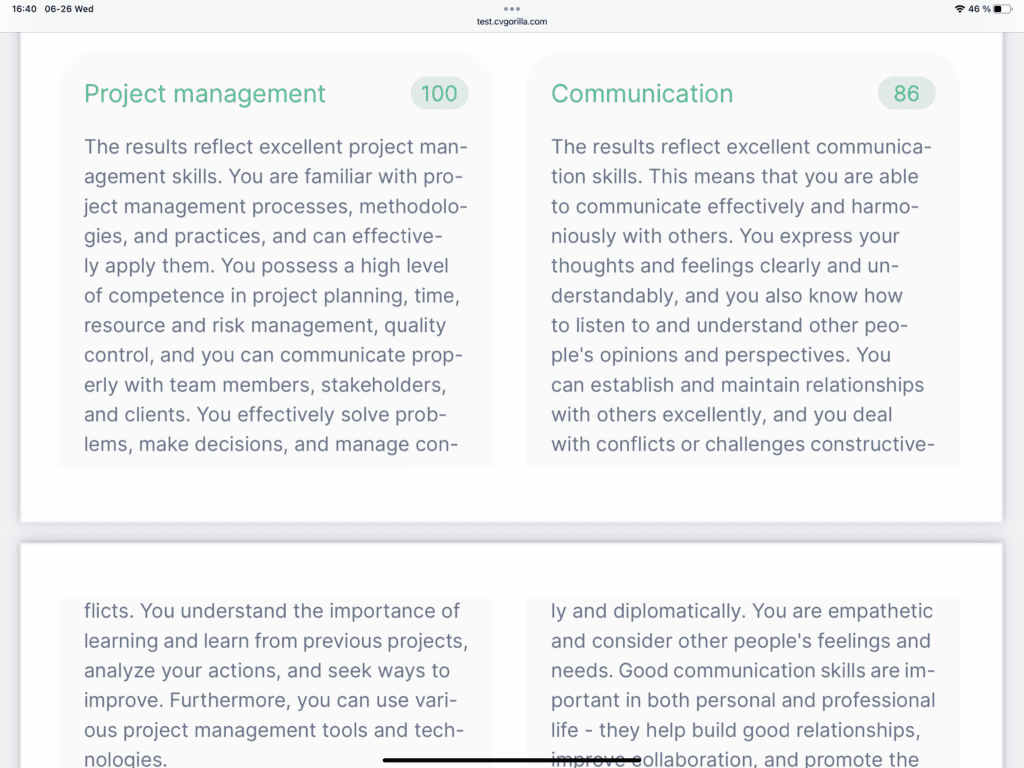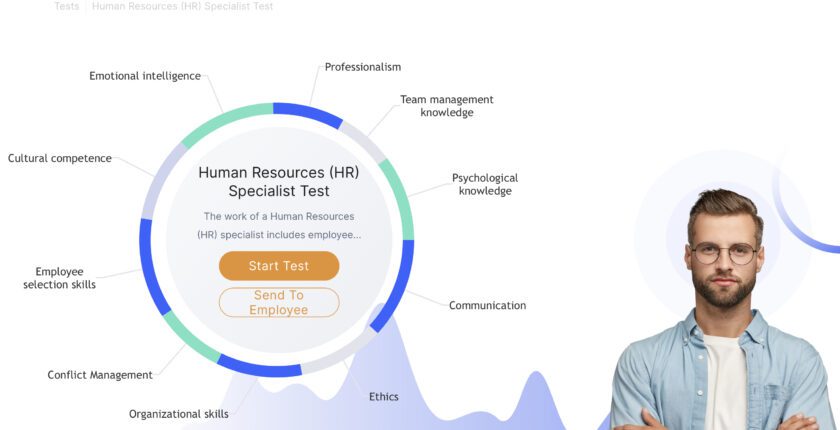Top Benefits of Skill Assessment for Employees 2024
In today’s rapidly evolving workplace, the mastery of skill assessment has become a cornerstone for career development and organizational growth. This pressing need has placed a spotlight on skill tests, heralded as key instruments in identifying strengths and pinpointing areas for learning and development. As companies strive for efficiency and competitiveness, understanding and leveraging the full spectrum of an employee’s capabilities—from soft skills and communication skills to critical thinking and problem-solving—can transform potential into performance. Moreover, the emphasis on assessment skills extends beyond technical abilities, encompassing personality traits essential for fostering collaborative and innovative working environments.
Check how amazing are skill test answers and recomendations: test.cvgorilla.com/answer
This article delves into the multifaceted benefits of skill assessment for employees and employers alike, offering a comprehensive overview of how these practices contribute to minimizing the skills gap, enhancing job performance, and promoting a culture of continuous improvement. From the practical implementation of skill testing to exploring real-world case studies, it draws a clear connection between effective assessment strategies and successful career development. Furthermore, it anticipates Jobs future trends in skill testing, providing invaluable insights into how advancements in assessment techniques could further refine the evaluation of a wide array of competences, including the assessment of communication skills, motor, process skills, and fundamental soft skills, ensuring that organizations and their workforce are well-equipped for the challenges ahead.
Understanding Skill Testing
Definition and Types of Skill Tests
Skill testing, often recognized under the umbrella of psychometric assessments, is crucial in evaluating two primary areas: personality, which indicates an individual’s preferred style of behavior, and aptitude, which assesses abilities in specific skills like verbal reasoning and numeracy. These tests are categorized into four main types: hard skills tests, work sample tests, cognitive ability tests, and personality tests. Hard skills assessments focus on specific areas such as software development or mathematics, directly measuring the proficiency required for frequently performed tasks in various roles. Work sample tests simulate real job scenarios to evaluate how candidates handle typical workplace tasks, which could include technical coding tests or case study presentations. Cognitive ability tests aim to gauge a candidate’s problem-solving and thinking skills in unexpected work situations. Lastly, personality tests assess the traits that influence how well a candidate might fit into team dynamics and workplace cultures, crucial for roles that involve significant interpersonal interaction.
Importance in the Hiring Process
Skill assessments play a pivotal role in the hiring process by providing a standardized method to evaluate a candidate’s job-relevant abilities. This standardization helps in minimizing hiring biases, ensuring that decisions are based on objective data rather than subjective impressions. For instance, cognitive and technical skill tests help determine a candidate’s ability to perform under pressure and solve problems efficiently, which are critical indicators of potential job performance. Moreover, incorporating skill tests early in the hiring process can save significant time and resources by filtering out candidates who do not meet the technical requirements of the job and job title, thereby enhancing the overall quality of hires. This objective approach not only streamlines the recruitment process but also supports legal defensibility in employment practices by providing transparent and equitable assessment criteria.

Benefits of Skill Testing for Employers
Skill testing offers substantial advantages for employers, primarily by enhancing the recruitment process through the reduction of bias, optimization of resources, and improvement in the quality of hires.
Reducing Hiring Bias
Skill assessments contribute significantly to fair hiring by focusing on a candidate’s abilities rather than subjective factors such as background or appearance. This objective approach is crucial in promoting diversity and inclusion within the workplace. By evaluating candidates based on their skills and knowledge, employers can mitigate unconscious biases that often infiltrate traditional hiring processes. This not only leads to a more diverse workforce but also helps in achieving better business outcomes.
Saving Time and Resources
Implementing skill tests in the hiring process can lead to more efficient use of time and resources. By quickly identifying the most qualified candidates, employers can reduce the number of interviews and decrease the reliance on extensive background checks. This streamlined approach saves considerable time and financial resources, allowing companies to focus on engaging with only the most promising applicants. Furthermore, by replacing manual resume reviews with automated skill assessments at the top of the recruitment funnel, organizations can expedite the initial screening process, saving countless hours otherwise spent on scrutinizing applicant resumes.
Improving Quality of Hire
Quality of hire is significantly enhanced through skill testing, as it allows employers to make informed decisions based on objective data regarding a candidate’s actual skills and abilities. This leads to better alignment between the job requirements and the candidate’s capabilities, ensuring that new hires are well-suited for their roles from the outset. Improved quality of hire not only boosts employee retention and engagement but also enhances overall workplace productivity. Additionally, by using data-driven methods to assess candidates, employers can avoid the high costs associated with poor hiring decisions, which can be substantial in terms of both financial impact and reduced workplace morale.

Benefits of Skill Testing for Employees
Providing an Equal Opportunity
Skill assessments ensure that every candidate and employee has an equal opportunity to demonstrate their abilities, fostering a level playing field in the workplace. By using standardized tests, individuals are evaluated purely on their skills and competencies, which helps companies better understand who the candidates are beyond their resumes. This approach is particularly effective in eliminating biases that can occur during the hiring process, ensuring that talent and potential are the primary factors considered.
Enhancing Skill Visibility
Skill tests provide immediate and clear feedback to candidates about their performance, highlighting areas where they excel and where improvement is needed. This visibility allows employees to understand their skill sets better and identify specific areas for professional development. Such assessments are crucial for personal growth and career advancement, as they help individuals align their learning paths with organizational needs and personal aspirations.
Boosting Confidence and Morale
Employees gain confidence when they receive positive reinforcement from skill assessments. Understanding that they are competent in their roles and recognizing areas where they excel can significantly boost morale. Furthermore, regular assessments and feedback contribute to a supportive work environment where employees feel valued and acknowledged. This not only enhances job satisfaction but also motivates employees to maintain or improve their performance, fostering a culture of continuous improvement and high achievement within the organization.

Implementation of Skill Testing
Key Steps to Implement Skill Testing
- Define the Role and Skills Needed: Start by clearly identifying the job role and the necessary skills, both technical and soft, required for the position. This precision helps in tailoring the skill tests to be as relevant as possible to the job requirements.
- Choose Professional Tests and Platforms: Utilize skill tests developed by professionals and select platforms known for their reliability and validity, such as Canditech. These platforms offer a range of tests that can be customized to fit the job role and ensure unbiased and accurate assessments.
- Customize Test Questions: Depending on the role, customize your tests to include a variety of question types that simulate real job scenarios. This could range from multiple-choice questions to more complex simulations that assess problem-solving and decision-making skills.
- Provide Clear Instructions and Resources: Before conducting the tests, provide candidates with all necessary resources and clear instructions about the assessment process. This preparation helps candidates perform their best, reducing anxiety and ensuring fairness.
- Establish and Communicate Cut-Off Scores: Decide on a minimum qualifying score for the tests and communicate this to all stakeholders. This transparency helps in maintaining fairness in the recruitment process.
Best Practices
- Simulate Real Job Scenarios: Enhance the effectiveness of skill tests by incorporating real job scenarios. This approach not only measures technical skills but also evaluates soft skills like communication and teamwork.
- Continuous Evaluation and Feedback: Regularly assess and update the skill tests to keep them relevant with changing job requirements. Provide feedback to candidates post-assessment, regardless of the outcome, to aid in their professional development.
- Promote Fair Testing: Ensure the testing process is free from bias by using blind evaluations and standardized assessment criteria. This promotes diversity and fairness in hiring.
Common Pitfalls to Avoid
- Avoiding Over-Reliance on Assessments: While skill tests are valuable, they should not be the sole criterion for hiring. Consider other factors such as work experience and cultural fit.
- Neglecting Candidate Experience: Ensure the assessment process is candidate-friendly. Poorly managed assessments can deter potential hires and negatively impact the company’s reputation.
- Ignoring Soft Skills: Do not focus solely on technical abilities. Soft skills are equally important and should be assessed through appropriate methods that encourage candidates to demonstrate these skills in practical scenarios.
By implementing these steps and adhering to best practices while avoiding common pitfalls, organizations can effectively use skill testing to enhance their hiring process and ensure they select the most qualified candidates.
Case Studies and Real-World Examples
Successful Implementation by Leading Companies

Leading companies have successfully integrated skill assessments into their recruitment processes, transforming hiring from a traditional, intuition-based approach to a more structured, data-driven strategy. For example, by implementing online skill tests at the start of the hiring process, companies have streamlined their recruitment operations. This change not only makes the hiring process more efficient and cost-effective but also ensures that recruiters can evaluate candidates’ test results alongside their CVs for a more accurate assessment. As a result, these organizations are not losing out on potential great-fit candidates at the initial screening step and are better positioned to identify candidates with the right skills for the job effortlessly.
Impact on Overall Hiring Efficiency
The impact on hiring efficiency is profound when skill assessments are employed. Companies have noted a significant reduction in the time and resources spent on manual application reviews, shifting the focus to shortlisting candidates based on their specific skills and qualifications. This method allows for a quicker identification of the most qualified candidates, ensuring that time and resources are spent only on those with the highest potential. Furthermore, by employing a technical screening test that includes soft skills questions, hiring managers can identify top-level talent with just a click, sorting candidates by test scores. This method not only whittles down the number of job candidates early in the process but also ensures that only those who demonstrate potential job fit are moved forward in the hiring pipeline. This streamlined approach has led to more accurate hiring decisions and improved the overall quality of new hires, which in turn enhances workplace productivity and employee satisfaction.
Future Trends in Skill Testing
Technological Advancements
The integration of artificial intelligence AI and machine learning (ML) in skill testing is set to revolutionize the assessment landscape. These technologies enable the collection and analysis of extensive data during assessments, allowing for more nuanced and accurate evaluations of a candidate’s abilities. For instance, AI can automate the generation of test cases and prioritize testing tasks based on risk assessment, thereby enhancing the efficiency and effectiveness of tests. Furthermore, the advent of computational psychometrics uses AI to analyze every interaction within a test, from keystrokes to video responses, providing deeper insights into a candidate’s skills and potential.
Additionally, remote testing technologies, which gained traction during the pandemic, are expected to continue evolving. These platforms facilitate assessments across diverse locations and conditions, ensuring inclusivity and accessibility. They support various devices and can operate with intermittent connectivity, making skill testing feasible even in less technologically equipped areas.
Evolving Workplace Needs
As workplaces become more diverse and inclusive, the demand for fair and unbiased testing methods is increasing. Future trends indicate a shift towards developing assessment tools that are culturally unbiased and involve diverse teams in their creation to ensure equity. This approach helps in accurately reflecting the diverse populations participating in these assessments, thereby supporting a more inclusive workforce.
Moreover, the expectation for workplace assessments to mirror educational technology practices is growing among new employees. This includes the use of conversational AI in assessments, which simulates real-life interactions and offers a more dynamic and engaging candidate experience. Such tools are particularly effective in high-volume hiring environments and are being adapted for more technical roles due to their interactive nature and efficiency.
These advancements in skill testing not only cater to the immediate needs of hiring and employee development but also align with broader organizational goals of diversity, efficiency, and technological integration.
Conclusion
Throughout this exploration, we’ve unveiled the immense value and potential that skill assessment holds for both employees and employers, pinpointing its pivotal role in enhancing job performance, fostering a culture of continuous improvement, and bridging the skills gap in today’s dynamic workforce. By systematically implementing skill testing, organizations can not only refine their hiring processes, ensuring a match between job requirements and candidates’ capabilities, but also empower their existing workforce by identifying and nurturing their skills for mutual growth. Such practices not only lead to optimized resource allocation and reduced bias in recruitment but also support a more engaged and proficient workforce dedicated to driving organizational success.
Looking ahead, as the landscape of work continues to evolve, so too will the tools and technologies that underpin skill assessments, offering more sophisticated, fair, and inclusive methods to evaluate talent. The integration of AI and remote testing platforms promises to make assessments more accessible and reflective of real-world job scenarios, further aligning with the needs of a globally dispersed and diverse talent pool. As we move forward into this future, I encourage you to check your skill by Cvgorilla test to stay ahead in your career journey, leveraging these advancements to their full potential. Embracing skill assessment is not just about keeping pace with today’s hiring trends; it’s about setting the stage for tomorrow’s achievements.
FAQs
- What makes skills assessments crucial in the hiring process?
Skills assessments are essential in modern recruitment as they help employers make well-informed hiring decisions and ensure that candidates are a good fit for specific roles. Incorporating these assessments can enhance the quality of hires, minimize biases, and improve the overall candidate experience. - What is the purpose of skill tests for employers?
Employers utilize skill tests because they offer a reliable, objective, and efficient method to assess the skills and competencies of both potential and current employees. This approach leads to better hiring decisions, more effective workforce planning, and ultimately, a more engaged and productive workforce. - What are the advantages of conducting pre-employment assessments?
Pre-employment assessments help increase employee retention by verifying that candidates possess the necessary aptitudes and personality traits required for the job. This ensures new hires are well-suited for their roles and comfortable with the demands of their positions. - What constitutes a positive skills assessment?
A positive skills assessment requires that all necessary documents are complete and accurate. It is crucial for applicants to ensure their occupation aligns directly with their work experience. Any discrepancies in the documents can result in a negative assessment.


